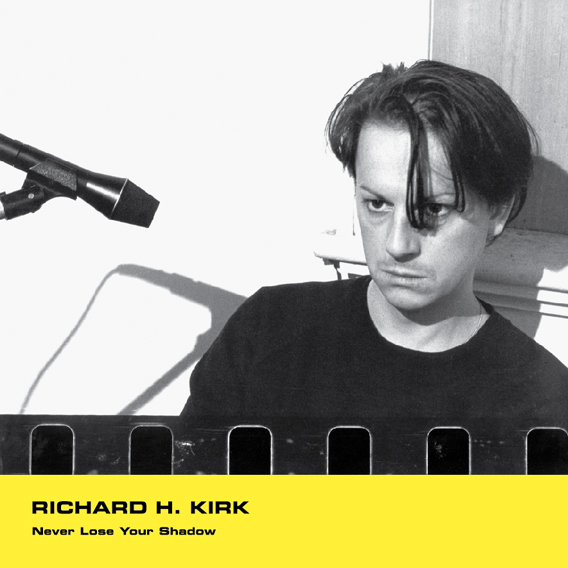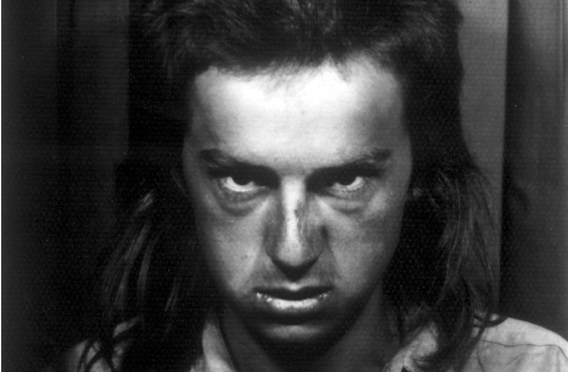Articles | Richard H. Kirk - Never Lose Your Shadow EP
News : Richard H. Kirk - Never Lose Your Shadow EP
Richard H. Kirk - Never Lose Your Shadow EP
07-07-2014
posted by admin
We’re honored to present a 12” EP of tracks from the archives of Sheffield based electronic music legend Richard H. Kirk, entitled “Never Lose Your Shadow”. Kirk first came to prominence in the 1970s as a member of the seminal industrial band Cabaret Voltaire. His first release as a solo artist, Disposable Half-Truths, came out in 1980 on Throbbing Gristle’s Industrial Records label and since then he developed a solo career parallel to the band until its dissolution in 1994.
On the EP, we compile tracks originally recorded between 1978 and 1987, which have never before been released on vinyl. The title track, ‘Never Lose Your Shadow’ blurs the lines between harsh industrial, dance floor, and no wave. This is one we’ve been playing out for a while now and wondering why it hadn’t been pressed on vinyl. The other three tracks are more experimental and reference ideas Kirk was exploring in Cabaret Voltaire at the time. When asked specifically about this collection, Kirk explains that “none of the tracks were outtakes for Cabaret Voltaire, they were always solo tracks, although I think ‘Never Lose Your Shadow’ was vey much a blueprint for the material that Cabaret Voltaire recorded for Virgin / Some Bizarre between 1983-85. The minimal sequencer / drum machine lockdown that I used later for Cabaret Voltaire was pioneered on this track. Lyrically, ‘Never Lose Your Shadow’ was inspired by the 1971 speed freak road movie ‘Vanishing Point’, amongst other things.”
The EP is limited to 999 hand-numbered copies, the first 500 are pressed on solid grey vinyl and the remainder on black. Note: the release date has been changed to September 16th, 2014, with pre-orders commencing on August 22nd.
Special thanks to Mute for agreeing to license this group of tracks.
Read more about the philosophy of Richard H. Kirk, as documented in the following quotes from an interview conducted by Rich Thomas, originally published in Magnetic in 2011:
“I don’t go back and re-polish stuff. I don’t conceptualize it too much. I leave that to other people afterwards.”
“You’re either going to get in your face hard house, trance or whatever they’re calling it this week, or you’re going to get stuff that’s totally chilled without any beats. The roots of downtempo have been forgotten.”
“I have this problem with my label. If I want to put out a release, the distributors are going to want something in writing that connects that release to me, so my aliases are kinda fucked in that way. On one hand I’d like to be more obscure, but conditions are dictating that maybe some of these things wouldn’t end up being manufactured and released.”
“I can’t write music. I can’t notate music down in notes in a way that it can be transcribed as sheet music. That’s why Cabaret Voltaire recorded everything to tape in the mid-Seventies.”
“I love accidents; I got all that from Brian Eno. I remember going to a lecture of Eno’s in the mid-Seventies when he did this tour. He illustrated his lecture by playing two or three pieces of music—one of them was “What’s Goes On” by the Velvet Underground—and he talks through this piece about how Lou Reed has three attempts to play this guitar solo throughout the track, and of course he fucks it up each time. But it sounds cool. I’ve always tried to stick with that philosophy. With fully digital editing, I can get rid of the accidents if I wanted to, but I tend not to.”
“I don’t believe in violence, but when you get people’s voice saying “We don’t this war,” and then you’re just ignored…”
“I don’t differentiate between short and long tracks. It’s all the same to me. The inspiration for doing long tracks came from listening to things like Indian music and “Sister Ray” by the Velvet Underground.”
“Computer technology has revolutionized music in general, not just electronic music. The shifts in electronic music have been governed by the machines; the boxes.”
“A lot of electronic music is tainted by drug scenarios. If I listen to a piece of Mozart, it doesn’t make me think of raving. Whereas when you listen to contemporary things that have come from that culture, you think, “Oh no, it’s that again. This is going to work on the whole MDMA comedown scenario.””
“There was a fusion band from America in the Seventies called McKendree Spring. They had this instrumental track called “God Bless The Conspiracy,” and they went to prison for it. I thought that was quite potent. That a piece of music could be banned in the West purely because if its title, because there were no words.”
“This is the hangover from the acid house rave thing. Wherever you go, fuckers just want four on the floor.”
“In the culture I grew up in—working class culture—everyone drank tea. My mother’s 85 and she still drinks ten cups of tea a day. I’m a coffee freak. I like Italian espresso. It gets the work done without the comedown you get from other stimulants.”
“A lot of the political side to music went by the by in the Eighties because it was a very greedy time. After punk it became fashionable to like money again. I think the political edge was blunted. I think it happened with the rave thing as well. A lot of people forgot about politics and just wanted to be dancing with loads of other people in a field, which is kind of political in itself.”
“Jean Paul Sartre has this phrase called ‘the Against.’ If you’re an artist, you’re in a position to challenge the fucking status quo. That’s where I’m coming from. That’s the job of an artist in society. It’s not to paint pretty pictures. It’s to say something, even if it’s only ‘Fuck you.’”
“I got off the dole in 1979. It was just after the Mix-Up album had come out. We’d got a check for £4,000. That was the day it was decided that Mallinder and myself would go full-time with Cabaret Voltaire.”
“Cabaret Voltaire was supporting the Buzzcocks in 1978, playing for 2,000 hostile punk rockers. We got spat at, we got things thrown at us, but I always thought it wasn’t so bad. The Buzzcocks actually got an iron bar thrown at them and they were the headlining band. But that’s what it was like back then. I think Suicide got the same treatment when they were supporting The Clash. I still remember that like it was yesterday.”
“I DJ from time to time—foolishly I allow myself to be persuaded to do this—and I’ve had people come up and complain about the music. I thought people complaining to the DJ about the music went out in the Seventies.”
“I don’t really have much of a social life these days. I only really exist through music. I don’t go to clubs much anymore, as it’s full of really young kids. People just think you’re a drug dealer. I got mistaken for a cop in a club once. I was fucking insulted, man.”
“Apart from in Japan in 1981—where we did have a lot of teenage schoolgirls chasing us around from place to place—Cabaret Voltaire never got groupies. It was very strange. Most of them were guys who were interested in the equipment. I’ve been in a relationship since 1978, so I wouldn’t have taken advantage of it anyway. I’m too honorable a guy to do that…Or maybe I’m just stupid, I don’t know.”
“I don’t know whether I have any artistic responsibility other than to myself.”
Catch Richard H. Kirk playing live as Cabaret Voltaire for the first time in 20 years, at Berlin’s Atonal Festival on August 24th.



Related Releases
-
Related Articles
-
-

